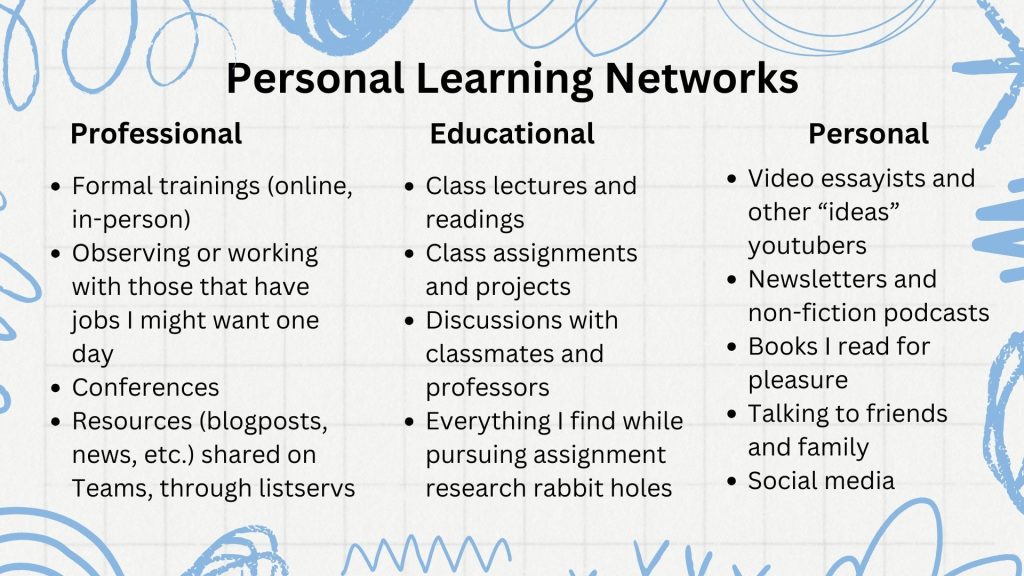When I was in high school and trying to figure out what I wanted to do with my life, my main criteria was that I wanted to be in a field in which I would always be learning. Of course, things in the world change so much that that’s true of almost any field, but it’s particularly important for libraries. Libraries are information centers, and in order to do the best job at educating and informing the public, we need to make sure we are educated ourselves, and at the rate the information landscape is changing today, that requires constant learning.
I’m intrigued by the concept of personal learning networks, so I took a second to map out my own.

One of the things I have found most important for myself is to curate my various feeds so that my passive media time — the time I spend watching YouTube videos or scrolling through social media or even checking my email — ends with me learning about something I’ve been interested in.
When it comes to the more formal kind of professional development, like trainings provided by the library, conferences, or even things like committees and work groups dedicated to solving a specific problem that are open to employees of all levels and job titles, I’ve found that, unfortunately, access isn’t everything. In her blog post “Library as a Classroom for Library Staff”, Sally Pewhairangi notes that the people who have the most trouble finding time for “upskilling” are part-time, front-facing staff, and she creates some 60 minute online trainings directed specifically towards time-crunched employees. While access to online trainings is absolutely something to strive for, management still must work to provide time — even if it’s just an hour — for their staff to dedicate to learning.
Self-directed learning on the part of library employees is important, but the only way it works is if management enables it by providing them with enough time — which sometimes means more than barebones staffing — to do so. I’ve often been frustrated at the library where I work when the training team puts forth interesting trainings on topics I’ve been curious about, only to find that we simply do not have the time or the staffing for me to be off-desk. It’s important for every level of management to consider this, whether it’s direct supervisors advocating for their direct reports to have dedicated time for learning, upper level management designating it as a priority system wide, or those who do the hiring taking it into account when deciding proper staffing levels.
Organizational structure can also play a role in professional development. If employees are allowed, or even encouraged, to go beyond their job descriptions to follow their interests, they can develop skills they never would have been able to if they were confined to their specific role. As Michael Stephens says in The Heart of Librarianship (p. 27),
“What we do is not simply what is written in our job descriptions. I’ve never known anyone who worked in a library who didn’t, often, stray far and wide from the tasks they were hired to do. We cannot afford siloed mind-sets. We go where we are needed and do what is necessary to serve those who come to us.”
Pewhairangi, S. (2016). Library as a Classroom for Library Staff.
Stephens, Michael. (2016). The Heart of Librarianship.
Alice-
You had mentioned that your library had interesting trainings but that there wasn’t enough time…
Where I work, I’m lumped in with the classroom paraprofessionals. I’m the only full time library para in the district and there is no training offered..ever…that is relevant to me. So I spend our required PD days doing things that are not connected to me at all.
I agree with you about the need for training and the need to make time for it. Most public libraries around me close for half a day for training, but I have no idea if everyone attends or how much actually gets done.
I hope this becomes more of a priority in the future.
Hi Denise,
That’s so frustrating that the only training you’re offered isn’t relevant to you! I hope at some point you’re at least offered some virtual library-related trainings you can take during that time.
Our library has one full staff training day per year, and while it’s useful (and mostly an excuse to socialize with people throughout the system), on its own it isn’t really enough to actually develop professionally. At least they’re trying.
Thanks for your thoughts!